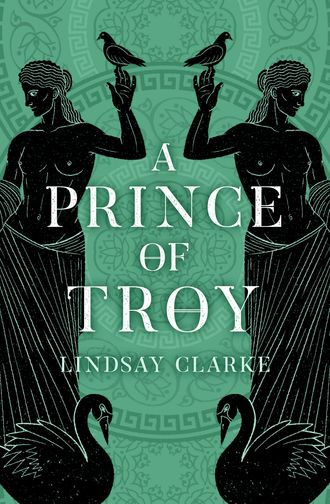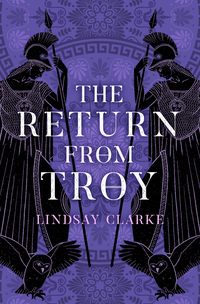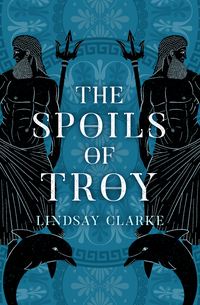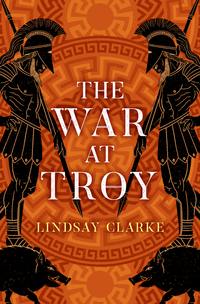
Полная версия
A Prince of Troy
Seeing an opportunity, Telamon sailed to Aegina and told his father that his curse had finally born fruit. If Aeacus would finance ten ships, he would return to Troy and take as plunder what had been withheld as payment. Aeacus agreed to put up only part of the money, so Telamon approached Peleus for the rest, but without success. In the end he and Heracles advanced against Troy with only six ships, but they carried enough men to breach the weakest part of the wall and sack the already devastated city.
In terms of hard coin and plunder, the expedition failed to make much profit, but Laomedon was killed and Telamon took his beautiful daughter Hesione as part of his share in the spoils. Priam’s most prudent son, Podarces, only survived the slaughter when he ransomed his life by revealing where Laomedon had hidden what was left of his treasure. Before sailing away, Telamon placed a battered crown on the young Trojan’s head and hailed him as King Priam.
Terrified, humiliated, but alive, Podarces swore to himself that he would wear the new name with pride, that he would do whatever was needed to redeem the fortunes of Troy, and that one day he would have his revenge on the barbarians from across the sea.
Before that time the Trojan people had tended to look westwards across the sea to Argos from where their ancestors had come in previous generations. The young King Priam now turned eastwards, opening up negotiations with the great bureaucratic regime of the Hittite empire, looking for loans to help him rebuild, and for trade to repay them. He met with a favourable response. Merchants of the Asian seaboard were also quick to see the advantages of a well-ruled city on a site commanding access to the Black Sea trade. Soon ships were putting in from Egypt too. New buildings began to rise inside the walls of Troy, not just new palaces and houses but also great weaving halls where the people were put to work manufacturing textiles from the raw materials that came into the city from the east as well as from their own mountain flocks. The Trojans’ capacity for work became proverbial and the quality of that work was high, so trade profited. Beyond the city walls, Priam encouraged his people’s traditional skills as horse-breakers until discriminating buyers began to look to Troy for their horses. And the king also took a particular delight in the powerful strain of bulls raised by his Dardanian kinsmen on the pastures of the Idaean Mountains.
Priam was not slow to thank the gods for the favour they had shown him. Soon after coming to the throne, he endowed an ancient mountain shrine to Apollo Smintheus, the bringer and healer of pestilence. Next he gave a new temple to the god inside the city, and then dedicated another on the sacred site at Thymbra. As his wealth increased, he built a spacious market square, surrounded by workshops and warehouses, and overlooked by a new temple which housed the Palladium, an ancient wooden image of the goddess standing only three cubits high that had been made by Pallas Athena herself, and on which the preservation of the city was said to depend.
Meanwhile the king had married. His wife Hecuba was the daughter of a Thracian king and their wedding sealed an important military and trading alliance. But there was also love between them, and Priam’s happiness seemed complete when his queen gave birth to a strong son whom they named Hector because he was destined to be the mainstay of the city. Not long afterwards, Hecuba fell pregnant again and everything seemed set fair until a night shortly before the new child was due, when Hecuba woke in terror from an ominous dream.
In the dream she had given birth to a burning brand from which a spawn of fiery serpents swarmed until the entire city of Troy and all the forests of Mount Ida were ablaze. Disturbed by this dreadful oracle of fire, Priam summoned his soothsayer, who was the priest to Apollo at Thymbra and had the gift of interpreting dreams. The priest confirmed the king’s fears – that if the child in Hecuba’s womb was allowed to live, it would bring ruin on the city.
Two mornings later, the seer emerged from a prophetic trance to declare that a child would be born to a member of the royal house that day. Evil fortune would be averted only if both mother and child were put to death. To Priam’s horror, Hecuba immediately went into labour.
Yet the queen was not the only pregnant woman in the royal household, and during the course of the morning, Priam received news that his sister Cilla had given birth to an infant son. Sick at heart, yet relieved to be spared the loss of his own wife and child, he commanded the immediate death of both his sister and her baby. Having seen the bodies buried in the sacred precinct of the city, Priam returned to his wife’s chamber hopeful that the gods were now satisfied and the safety of his city assured. But night had not yet fallen when Hecuba also gave birth to a son.
Priam looked up from the peaceful face of the child to see the priest and priestess of Apollo entering the bedchamber. He knew at once what was required of him, yet he could not bring himself to order these further and still closer deaths. ‘Isn’t it enough that one royal mother and her child have died today?’ he demanded. ‘Let the gods be content.’
Gravely the priest reminded him of the terrible fate that had fallen on Troy when his father Laomedon had tried to cheat the gods, and the priestess remained implacable in her conviction that the child at least must die. Had not Hecuba’s own dream warned her that she carried the ruin of the city in her womb? Could it be wise to let it live at such dreadful cost?
‘You have brought this evil into the world,’ she said. ‘Have the strength and wisdom to let it die by your own hand.’
When Hecuba could only wail out her refusal, the priest turned his gaze on the king. ‘Will you risk all you have built for the sake of an ill-omened child?’
‘I have served Apollo well,’ Priam protested. ‘How have I wronged him that he should persecute me so?’
The priest opened his hands. ‘Apollo looks deep into the well of time. His concern is for the protection of this city.’
‘If your kingdom is to live,’ the priestess insisted, ‘the child must die.’
‘My sister and her newborn child are already dead at my command,’ Priam cried. ‘Would you have all the Furies roost in my mind? How much blood guilt do you think I can bear?’
The priest looked away. ‘It’s not we who demand this sacrifice. The king must choose between his city and the child.’
Looking for mercy where none was to be found, Priam lifted his eyes. ‘Then let it be the child. But not at my wife’s hand. And not at mine either.’ He dragged the wailing infant from his wife’s arms and gave it to the priestess. ‘Do with it as you will,’ he gasped, ‘and leave us to our grief.’
With Hecuba screaming behind them, the priests left the chamber and handed over the baby to be killed by a palace guard. But the man could not bring himself to do the deed. When he consulted his friends, one of them said, ‘Give the job to Agelaus. He’s used to butchery.’
And so, hours later, in the village where he lived in the Dardanian mountains beyond the plain of Troy, the king’s chief herdsman was drawn from sleep by a horseman hammering at his door. Told what was required of him, Agelaus looked down where the infant’s swaddling bands were coming unwrapped.
‘It seems a fine boy,’ he said. ‘Why does he have to die?’
‘Because the king commands it,’ the horseman replied.
Wondering why this unwanted task should have fallen to him, Agelaus shook his head. ‘Did the king say by what means the child should die?’
‘By any means you choose.’ The man wheeled his mount to gallop away. ‘This thing is the will of the gods,’ he shouted over his shoulder. ‘Be free of it.’
Though he had slaughtered countless animals in his time, Agelaus had no more stomach than the guard for cutting an infant’s throat. Frowning down at the scrap of life in his arms, he muttered, ‘If the gods think you should die, let the gods attend to it.’ Then he took the child to a forest glade on the slopes of Mount Ida and left it there to perish or survive as fate decided.
Three days later, driven by his wife’s insistence, the herdsman returned to the glade. When he saw the tracks of a bear headed that way, he expected to find nothing more than bloodied swaddling bands, but as he came closer a thin sound of crying drifted towards him on the breeze. Hurrying through the brakes, he found the baby still alive, bawling for food and almost blue with cold. Instantly his heart went out to it.
Holding the infant against his chest for warmth, he said, ‘If the gods have sent a she-bear to suckle you, boy, they must mean you to live.’ Tenderly, he placed the baby in the wallet slung at his side, and brought it home to his wife. It was she who spotted the birthmark like a kiss on the baby’s neck and her heart was quickly lost to it. This child had been sent to them, she declared, and she would care for it. She named him Paris, which means ‘wallet’, because of the strange way in which he had come to her.
As the years went by, Paris soon distinguished himself both in courage and intelligence from the herdsmen round him. Even as a child he showed no fear among the bulls, and his greatest delight was to watch them fight one another and to see his own beast triumph. Under the patient tutelage of Agelaus, he soon proved himself a good huntsman and a skilful archer too. And he was still only ten years old on the day when he used his bow for a deadlier purpose than shooting wildfowl, though that had been his only intention when he took off into the woods.
The sun was thunderously hot that day and the air heavy. Paris had set out cheerfully enough but by early afternoon he was feeling drowsy and irritable. Casting about in the bracken for the arrows he had loosed and lost, he felt as though the thunder had got inside his head, so with only an old buck-rabbit and a partridge hanging at his belt, the boy was coming listlessly back down the hillside through the trees when he heard a restive sound of lowing from the cattle penned below.
Dismayed that his father had decided to move the herd without telling him, Paris was about to run down to join the drive when he heard men shouting – unfamiliar voices, strangely accented, barking out commands. He came to a halt while still under the cover of the trees and saw a gang of cattle-lifters breaking down a fence that Agelaus had built that spring.
He had counted nine of them, all armed with spears or swords, when more shouts drew his eyes to the right where Agelaus was running across the hillside from the settlement, followed by two of his herdsmen. They had no more than staves and a single hunting-spear between them. A burly man wearing a helmet and a studded leather jerkin advanced to meet them, drawing his sword and shouting to the others for support.
Paris’s grip tightened on his bow. He saw that there were seven arrows left in his quiver. Swallowing, dry-mouthed, he took one of them between his fingers and nocked it to his bowstring.
By now six of the rustlers confronted Agelaus and his followers on the open meadow, and the other three were coming up quickly. As Agelaus grabbed the spear from the older man at his side, the helmeted leader brandished his sword and ordered one of his spearmen to throw. The man lifted his spear and was about to loose it when an arrow whistled out of the trees and pierced his neck. Herdsmen and rustlers alike watched in amazement as a gush of blood spluttered from his mouth, the spear fell from his hand and he crumpled to the ground. Seconds later, with a sparking of metal against metal, another arrow glanced off the leader’s helmet. Taking advantage of the shock, Agelaus hurled his spear with such force that it drove through the jerkin and dragged the man down to the ground where he lay writhing and slobbering.
Again, for several moments, everyone stood transfixed.
A third arrow flew wide and stuck quivering in the grass. The rustlers had lost their leader but all three herdsmen were now weaponless with seven armed men standing only yards away. Paris loosed another shot at a scrawny rustler, who instantly dropped his spear to clutch at the shaft stuck in his thigh. The remaining cattle-lifters turned uncertainly, not knowing how many assailants were hidden in the trees. When a fourth man grunted and stared down to see an arrow trembling in his belly, three of the others started to run off down the hill. Moments later, unnerved as much by the unexpected alteration in their fortunes as by the groans of those dying around them, the others made off, stopping only to aid their injured comrade.
Agelaus and his companions were watching them hobble away down the hill when Paris came out from between the trees, carrying his bow. He heard his friends calling to him as if from a far distance. The air wobbled about his head. His throat was very dry. ‘I had only two arrows left,’ he mumbled as he fought free of Agelaus’s embrace. Then he stood, looking down at where the dead leader lay with the spear-shaft through his lungs. Turning away in recoil, he saw the body of the man with the barb through his throat, and a third, who gazed up at him as if beseeching him to take back the arrow from his belly.
A nimbus of darkness circled behind the boy’s eyes. He was watching the dying rustler choke on a gush of blood from his mouth when that dark circle widened and thickened so swiftly that it consumed all the light in the day.
He woke to the sound of water running over stones. He was beside a river in the shade of a thatched awning, lying on a litter, and the flash of white rapids came harsh against his eyes. The air about his head was aromatic with herbs. Savouring the mingled scents of balm, camomile and lavender, he moved his head and moaned a little at the dizziness. Then he saw the grey haired man sitting on a nearby rock, fingering the long curls of his beard.
A girl’s voice said, ‘I think he’s awake.’ Paris turned to look at her. ‘Yes,’ she cried, ‘he is,’ and her face broke into a bright, gaptoothed smile. Her hair also hung in curls, but so fair and fine they might have been spun from the light about her head. Wearing a white smock marked with grass stains, she was playing with a mouse that ran between her small hands. She was perhaps six years old. At her back, some distance away, were two grassy hummocks with stone portals, which looked like burial mounds.
‘Bring him some water,’ her father said, putting a gently restraining hand to the boy’s shoulder. ‘Lie still for a while,’ he smiled. ‘All will be well.’
Paris tilted his face to watch the girl as she stretched out to hold a drinking cup under a freshet of water bursting from a dark cleft in the rocks. The inside of his head felt burned out with pain. It was as though his violent dreams of fire and smoke and blazing buildings were still smouldering in there.
The girl came back and lifted the cup to his lips. ‘You’ve been very sick, Alexander,’ she said with the air of one endowed with privileged knowledge, ‘but my father has the gift of healing. You’ll soon be strong again.’
The water flowed across his tongue to break like light in his throat. He licked his parched lips, drank some more, then laid his head back. Struggling to retrieve the recent past, he remembered how the flies had gathered round the bloody wounds of the men he had slaughtered. His breath whimpered a little. Then he said, ‘My name isn’t Alexander.’
‘No, it’s Paris, I know. But you’ve been given another name since you drove off those cattle-lifters. They say you may only be a boy but you’ve become a defender of men, so that’s what they call you now – Alexander. I like it better.’
‘That’s enough now,’ her father said. ‘Give him time to come to himself.’ He smiled down at the boy again. ‘I’m Apollo’s priest at this shrine. My name’s Cebren. Your father brought you here three days ago to be cured of the burning fever. He’ll be glad to learn that the mouse-god has looked kindly on you. In two days he’ll come to bring you home. All you need now is rest.’
Конец ознакомительного фрагмента.
Текст предоставлен ООО «ЛитРес».
Прочитайте эту книгу целиком, купив полную легальную версию на ЛитРес.
Безопасно оплатить книгу можно банковской картой Visa, MasterCard, Maestro, со счета мобильного телефона, с платежного терминала, в салоне МТС или Связной, через PayPal, WebMoney, Яндекс.Деньги, QIWI Кошелек, бонусными картами или другим удобным Вам способом.





